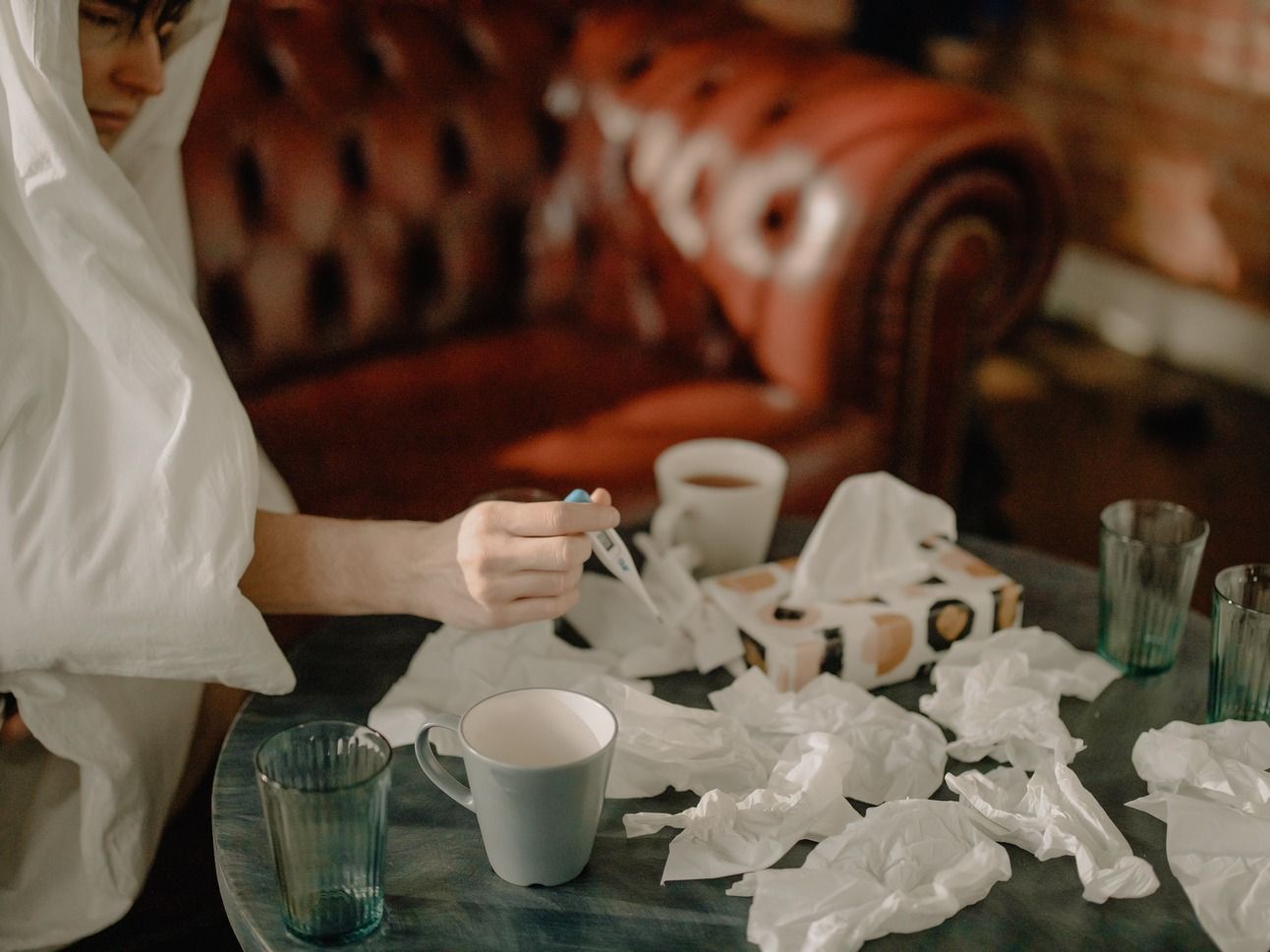
Don’t let this be your version of a white Christmas!
Photo by cottonbro studio: https://www.pexels.com/photo/person-holding-white-ceramic-mug-4114009/
With the holidays comes the season of infections, particularly upper respiratory viruses. There’s several potential reasons for this, most of which involve an overloaded immune system from things including increased sugar intake with holiday treats, increased stress, crowded travel conditions, and diminished vitamin D levels from less sun exposure during the winter months.
Here in South Texas, we have the added joy of mountain cedar pollen season – one of the heaviest pollen events in the United States – to provide respiratory distress of its own, as well as to further burden our overloaded immune systems.
While some of these sources of holiday illness can’t be avoided, there are some things you can do to maximize your immune function and reduce your chances of getting sick (although being sick does provide an excuse to avoid certain family members you might rather not see during this joyous time of year!).
At the top of the list of things you can control is keeping your sugar intake down as much as possible. If you can’t bring yourself to avoid the treats altogether and want to partake of cookies, pies, candy, etc., my suggestion is to keep the portions you consume in one sitting small. Have one cookie at a time instead of three (or five or ten). The trick here is to spread out the sugar over the course of each day rather than bingeing on it all at one time. This at least moderates the need for your body to compensate for the swings in blood sugar.
Another important way to ward off illness is to get regular exercise and physical activity. Even better, try to get some of it outdoors on sunny days. Exercise stimulates circulation and lymphatic drainage, as well as helps you manage stress. All of these effects help your immune system function at a high level.
Activity in the sun only allows your body to form vitamin D in the skin - provided some of your skin is exposed. By exposed, I am referring to not covered by clothing. Although high SPF sunscreens may somewhat decreased vitamin D synthesis, as long as your skin is not covered by clothing, you’ll get some vitamin D and it, among many other beneficial things it does in the body, enhances your immune function. If you can’t get regular sun exposure, supplementation with about 10,000 IU of oral vitamin D would be a good idea.
Being in the sun also brings infrared exposure (even when your skin is fully covered), which is beneficial for immune function and reducing inflammation in the lungs.
Exercise, outdoors or otherwise, is also beneficial for mitigating stress and reducing depression and anxiety, which can be major issues for many this time of year.
In addition to vitamin D, there’s other supplements that can help boost your immune system to avoid getting sick and help you fight it off if you do. Vitamin C is of course on the list, as is zinc. Dosing recommendations vary depending on the form of the nutrients you’re taking, so I suggest following package directions.
I also highly recommend black elderberry (liquid or capsules), also known as sambucca, sambuccus, and sambuccol (with variations in spelling). It can be taken as a preventive measure as well as when you are already sick. If you take it when sick, just be prepared for a potentially increased fever after the first few doses as it does a pretty good job of activating your immune system to fight viruses.
While travel to see family and friends is a part of the holiday tradition for many, air travel in particular presents not only increased emotional stress, but flights and airports tend to be packed full of people, a relatively high percentage of whom are sick and freely sharing their viral holiday cheer. Throw in the increased chance for weather-related delays and you can wind up spending quite a bit of time exposed to a wide assortment of infectious agents.
You may not be able to get out of the holiday air travel experience without also being sent on an all-expense paid guilt trip, but I think its worth considering staying home for the holidays, availing yourself of virtual travel via Zoom, Skype, Facetime, etc., and seeing family and friends in-person at more travel-friendly times of the year.
If you do wind up getting sick, try to get some rest, drink some hot fluids, get some sun if you can, and I suggest bumping up the immune booster supplements mentioned previously. One other piece of advice I have is if you get a fever, unless it goes higher than 104, don’t take anything to suppress it. Yes, you’ll feel worse in the short term, but fever is an important part of the immune response and if you suppress it, you’ll typically delay your recovery considerably.
I hope you find these tips helpful and I wish you healthy, happy, and sane holidays!
Until next time…
George F. Best, D.C.

